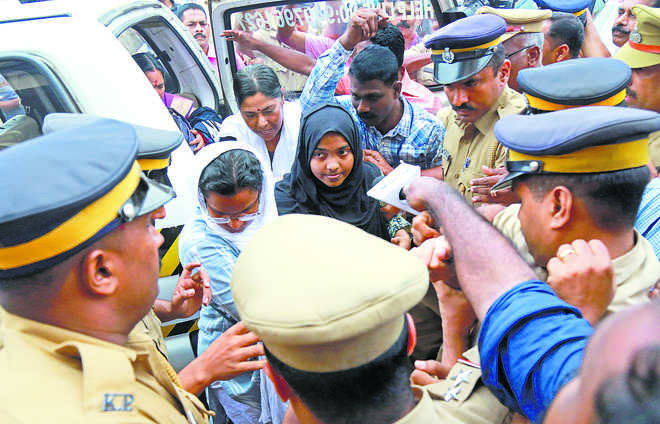
Hadiya (in black scarf) at the Kochi airport recently. Reuters
Faizan Mustafa
VC, NALSAR University of Law, Hyderabad
Individualism is the central theme of civil liberties under our Constitution. Individual autonomy in terms of choices of food, dress, religion etc has now been upheld by the apex court in the nine-judge Bench privacy judgment. Conversion to another religion as well as the option of marrying a person of one's own choice are an integral part of individualism with which the state and others should have no concern. Thus, courts cannot probe the validity of marriage if the two adults have married under applicable personal law.
In fact, if two adults are living together without marriage, the court is similarly powerless and cannot pass a moral judgment on their living together without lawful marriage. Even in cases of adultery, when a husband is not faithful to his wife and has sexual relations with another woman, it is only his wife who can file a criminal complaint. Criminal law is not supposed to enter our bedrooms.
The debate on love jihad is politically motivated and has ulterior motives. Love jihad is a bogey. In a country of our size, assuming, though not accepting even if a few hundred such cases are there, this cannot be termed as love jihad or an organised effort by some Muslim radicals to convert Hindu girls. A number of Muslim kings did marry Rajput girls and did not force them to convert. They rather enthusiastically celebrated Hindu festivals with them. Leading politicians of all parties, including the BJP, do have Muslim wives. No one ever called their marriages as love jihad.
It is a sad commentary of our judicial system that first the Kerala High Court declared Hadiya’s marriage as illegal and now in spite of two hours’ hearing in an open court and her bold and courageous testimony that she had converted to Islam on her own and wants to live with her husband, the Supreme Court has not granted her permission to live with her husband. Hadiya who is 26 years of age will now stay in a hostel. The only redeeming feature of the order is that she has now been taken out of her father's custody.
On the contrary, the Rajasthan High Court recently permitted a similarly situated girl converted Hindu girl to go with her husband. Hadiya is 26 years of age and should be allowed to make her personal decisions as a matter of right rather than some privilege granted to her by the court. Hats off to this brave girl who withstood all family, police and media pressures. Her husband is lucky to have such a wife.
The Indian law, in fact promotes, so called love-jihad by permitting marriages between persons belonging to different faiths. The Special Marriage Act governs inter-religious marriages. It is strange that the Kerala High Court which itself was convinced due to the girl and boy’s testimony in this case that it is not a case of undue influence on the girl suddenly made a u-turn when it was informed of marriage between the two. Media debates on love jihad should not influence the independent judicial mind. Here, marriage happened after a matrimonial advertisement was given by the girl and, therefore, it is not a case of love jihad. In a similar matter, another Bench of same High Court recently took another approach and refused to intervene. Thus, there is no consistency in the judicial response.
Parental custody ends on the child attaining maturity. In this case, the girl attained maturity eight years ago, yet her custody was given to her father by the High Court. Her individual autonomy to take her own decisions had been seriously undermined. No father can impose his decisions on his adult children.
The Kerala High Court judgment reflects patriarchy as it considers women vulnerable. Moreover, the validity of a marriage cannot be decided by any high court if the parties are adult. Moreover, power can never be exercised in a writ jurisdiction. No right of the father has been violated just because his adult daughter married a man of different religion.
Unfortunately, the apex court’s order of November 27, 2017, has yet again enforced patriarchy. It has not unequivocally accepted complete autonomy of the adult Hadiya to choose her spouse. Religious laws give undue importance to guardianship. In the Manusmriti, we are told that a woman is never independent — in childhood she is dependent on her father, in adulthood on her husband and in old age on her son. A country which wants a uniform civil code cannot make a father’s consent to the marriage of an adult daughter mandatory.
Today, the rights revolution, which our Constitution ushered in, is under serious threat. Freedom of speech is being curtailed in the name of sedition even in violation of the Supreme Court's order that mere words do not amount to sedition; books are banned and films are censored because we do not trust individual judgments anymore; rightist governments are more interested in protecting the reputation of imaginary characters such as Rani Padmavati; right to privacy is being curtailed in the name of the Aadhaar card and now even freedom to marry a person of one's choice is under threat and may be termed as terrorist activity.
Authoritarian governments world over do not believe in the rights discourse. They talk in terms of larger 'public interest' and their jurisprudence is generally ‘duty’—centric. Unfortunately, lately it seems that even our judges who jealously guard their own rights do not demonstrate similar enthusiasm in protecting citizen's liberties. The Indian Supreme Court has yet another occasion like the privacy case to demonstrate its unflinching commitment to individualism and freedom of choice.
Criminal law cannot enter the bedroom
- Conversion to another religion as well as the option of marrying a person of one's own choice are an integral part of individualism.
- Courts cannot probe the validity of marriage if the two adults have married under applicable personal law.
- if two adults are living together without marriage, the court is similarly powerless and cannot pass a moral judgment on them.
- In cases of adultery, when a husband is not faithful to his wife and has sexual relations with another woman, it is only his wife who can file a criminal complaint.



























